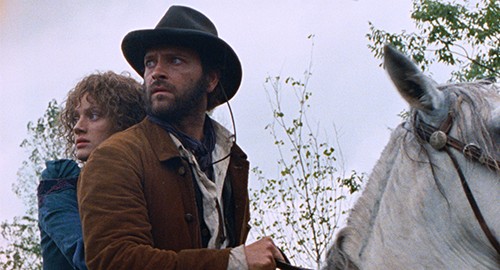Agli inizi del '900, il Wild West Show di Buffalo Bill arriva a Roma per vendere agli italiani il mito della frontiera, a colpi di fucili a salve e spettacoli di cowboy. Qui, nella cornice di una gara di doma divenuta leggenda tra cowboys e butteri italiani, Rosa, giovane moglie del signorotto locale, si innamora di Santino, il buttero che vince la sfida. In seguito all'omicidio del marito, Rosa e Santino fuggono insieme, ma la giustizia, come sempre, è venduta al miglior offerente e sulla testa di Santino viene messa una grossa taglia. Con Buffalo Bill sulle loro tracce, Rosa sogna l’America, quella vera, non quella dei manifesti pubblicitari con i bisonti, ma il suo sogno dovrà fare i conti con la realtà. Perché, come in ogni ballata western che si rispetti, il destino lancia la moneta. E spesso, la verità resta sepolta sottoterra.
Ci piacerebbe fare un “western pastorale”, ambientato nell’Italia postunitaria, tra la fine del brigantaggio e la prima industrializzazione. Un’Italia in cui il Circo di Buffalo Bill ha già portato il mito americano del West.
I conflitti che percorrevano il nostro paese non erano così diversi da quelli dell’America raccontata dai cosiddetti western revisionisti: un periodo di instabilità, di nuove leggi e nuovi padroni, di cambiamento, in cui le regole erano poche e confuse; un mondo di soldati, guardie e fuorilegge. L’Italia di quel periodo è un paese all’alba di una modernità incentrata sul profitto, sull’individualismo, sulla burocrazia che prende gradualmente il posto di un mondo profondamente arcaico, contadino e feudale.
Il film è la storia dell’amore tra Santino e Rosa e della loro fuga disperata verso il nulla vista attraverso lo specchio ironico e deformante di una storia orale in cui la verità è sempre altrove, i fatti non coincidono mai con il loro racconto. Un fatto di sangue fa di Santino un eroe per alcuni, un fuorilegge per altri. Rosa è l’unica a cui davvero interessa la verità della storia, della sua storia, finché non realizza che questa per gli altri non è poi così importante, perché nessuno le crede. Rosa proietta - in modo anche onirico - su Santino i suoi desideri: di amare ma anche di odiare, di emanciparsi, di fuggire e reinventarsi nella fuga.
Ogni eroe è tale finché regge la sua storia, vera o falsa che sia.
Regia
Alessio Rigo De Righi, Matteo Zoppis
Soggetto
Alessio Rigo De Righi, Matteo Zoppis, Tommaso Bertani
Sceneggiatura
Alessio Rigo De Righi, Matteo Zoppis, Carlo Salsa
Altri credits
Giacomo Lamborizio (Responsabile sviluppo)
Interpreti
Nadia Tereszkiewicz, Alessandro Borghi e John C. Reilly, Peter Lanzani, Mirko Artuso, Gabriele Silli e con la partecipazione di Gianni Garko
Produttore
Tommaso Bertani, Alex C. Lo
Co-produttore
Filippo Montalto, Francesco Montalto, Massimiliano Navarra, Olivia Musini, Stefano Centini, Augustina Costa Varsi
Produzione
Ring Film, Cinema Inutile, con Rai Cinema; in associazione con Andromeda Film, Cinemaundici e in collaborazione con Volos FIlms Italia
con il sostegno di Film Commission Torino Piemonte -
Piemonte Film Tv Development Fund - giugno 2022; Regione Lazio - Lazio Cinema International 2023 2a edizione; Ministero della cultura: contributi selettivi di sviluppo, pre-produzione (luglio 2022), produzione (1a edizione 2024); Regione Toscana - Bando per la concessione di sovvenzioni a fondo perduto, per la produzione di opere cinematografiche e audiovisive, anno 2023; CineMArt/Eurimages Co-production Development Award - febbraio 2023
Distribuzione
01 Distribuzione
Premi e festival
Festival de Cannes, 2025 Official Selection - "Un certain regard".
